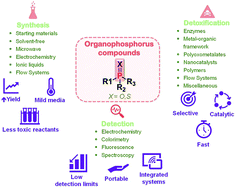Organophosphorus chemical security from a peaceful perspective: sustainable practices in its synthesis, decontamination and detection
Abstract
Organophosphorus compounds play an important role in the modern chemical industry and have a broad range of applications as flame retardants, agrochemicals, and chemical warfare agents. Unfortunately, they still present a big concern from a safety and security perspective considering their high toxicity to humans and the environment. Because of the former record and the persisting risks of some of these chemicals being used as weapons of mass destruction, the chemical weapons convention implemented by the organisation for the prohibition of chemical weapons, has classified a wide range of these chemicals as substances subject to a stringent verification regime. The existing practices for the production, detection and decontamination or destruction of unwanted organophosphorus compounds require high safety and security standards, which are not always attained only by sound management practices. The present review highlights the contribution made by the emerging research and early technology development in the field of green chemistry concerning these chemicals. Firstly, the advances regarding the safe synthesis of these compounds are covered not only due to their extensive legal commercial use but also as reference chemicals in verification processes. Aspects such as greener starting reactants, microwave irradiation, electrochemical synthesis and the use of ionic liquids are among the most promising alternatives. Another topic addressed is the decontamination of these toxic agents in the case of undesired stockpiles, for example, seeking their safe neutralization using mild conditions. The use of catalysts (derived from enzymes, metal–organic frameworks, polyoxometalates, nanomaterials, polymers, etc.) and continuous flow systems stand out. Finally, the greener detection of organophosphorus compounds is presented, which is relevant for inspection procedures regarding their prohibited use or misuse. This review is focused on the sustainable preparation of organophosphorus compounds and faster and cheaper architecture with lower detection limits for their detection, relying on integrated systems for multiple responses and facile applications such as wearable devices. Overall, the developments summarized provide a guide for researchers and the industry in this field, while also attracting the attention of policy makers to the undisclosed potential of green chemistry in this security sensitive domain. However, despite the progress, continuous efforts are imperative for the further development of intrinsically safer, more efficient and sustainable technologies in this field.

- This article is part of the themed collection: Green Chemistry Reviews


 Please wait while we load your content...
Please wait while we load your content...